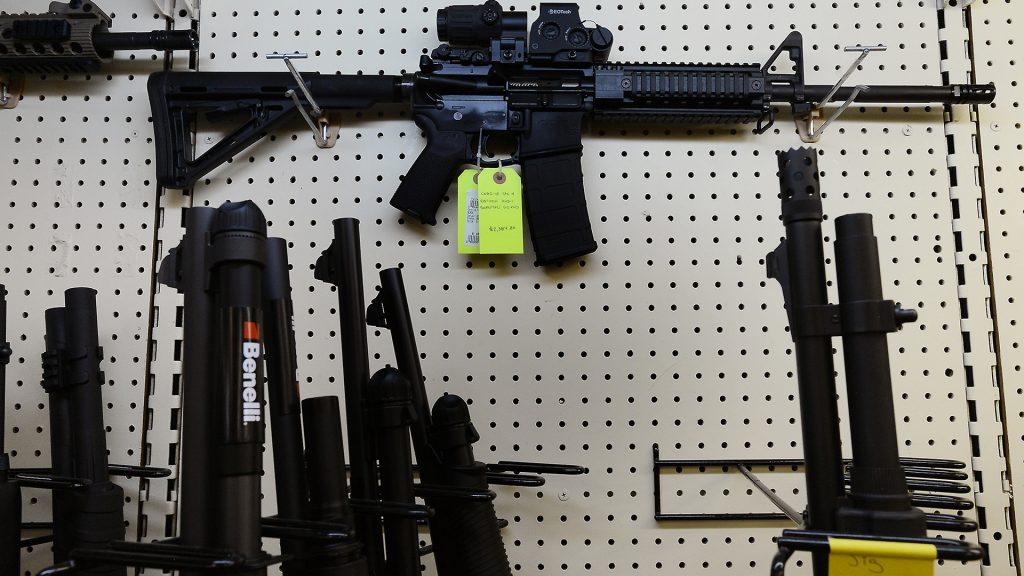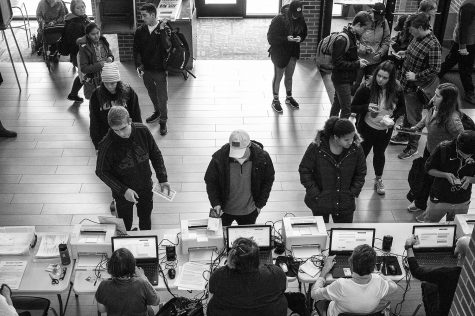Weigel: Sizing up gun reform post-midterms
Why doesn’t the U.S. have “common-sense” gun control laws in the wake of all the recent mass-shootings?
On display at Perry’s Gun Shop in Wendell, North Carolina, an AR-15 assault rifle manufactured by Core15 Rifle Systems. The weapon costs $2,384 and features an EoTech optical sighting system and a 30-round magazine capacity. (Chuck Liddy/Raleigh News & Observer/MCT)
November 25, 2018
While the First Amendment of the Constitution — which lays out the five fundamental freedoms of speech, religion, petition, assembly, and press — has been chipped away throughout our nation’s history, the Second Amendment — the right to bear arms — has largely been upheld.
This raises a provoking question: Why aren’t there “commonsense” gun-reform laws? After all, there is a bevy of commonsense Supreme Court rulings that have curtailed our First Amendment freedoms. For instance, you can’t make stuff up to defame people. And if you want to throw a parade or organize a big public protest, you need a permit. The list of limits to our freedoms goes on and on, but the point is that it’s not unprecedented for our rights and liberties to be limited.
This brings me back to the question I posed: Why aren’t there more limits to guns? You’d think that since the U.S. is a democratic country, our politicians would pass policies curtailing gun rights, seeing as more than 60 percent of Americans favor stricter gun control, according to Gallup. So how can it be that the U.S. continues to have some of the most lax gun-control laws in the world?
The answer is politics. Our politicians — the people who decide who gets to do what, when, where, why, and how — are not fulfilling their duty to represent the will of the people.
RELATED: Shaw: South Carolina representative’s notions on gun safety are mind-boggling
It seems that our politicians would rather score partisan political points than pass pragmatic policy that the public supports. According to Gallup, 87 percent of Democrats support tougher gun laws while only 31 percent of Republicans support tougher gun laws. Of independents, 61 percent support tougher gun laws.
Thus, while the majority of Americans do support stronger gun laws — 30 percent of the public identify as Democrats and 39 percent identify as independents — Americans who identify with the minority party (according to the same Gallup poll, only 28 percent of Americans identify as Republicans) are having their way.
The answer to why we don’t have stricter gun laws is actually quite simple. Republicans control government — at the national and state level — and instead of passing policies that the majority of the public favors, they are dead-set on pleasing Republicans, who are for the most part not in favor of stricter gun laws.
However, there is reason to believe our politicians might finally have to start listening to the public as a whole instead of simply their partisan base. Democrats took the House in the midterms, ending an era of unified Republican control over national government. Hence, when the new legislative term starts in January, you can bet your life savings that the Democrat-controlled House will propose a gun-control bill.
RELATED: Kumar: Politicization, hypocrisy overshadow tragedy of Parkland
And there’s reason to be optimistic that the Republican-controlled Senate and President Trump might actually go along with the bill. Public support for stricter gun laws is only growing with every mass shooting, and anyone can tell you that Trump loves to claim credit for popular policies. Ergo, to avoid public backlash, the Senate very well could pass a watered-down gun-control bill, and Trump realistically could sign it.
Moreover, at the state level, while Republicans do still have unified control of government, Democrats made inroads in the Iowa House and Iowa Senate, raising the prospects of stricter gun laws making their way to Gov. Kim Reynolds’ desk.



















